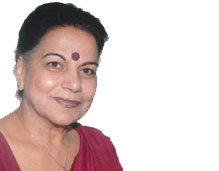You are here

| Archive data: Person was International Visiting fellow at IDSA from September 2009 to February 2010 |
A Senior Fellow at the World Policy Institute in New York and the UN Representative of the Academic Council of the UN System, Swadesh M Rana is the former Chief of the Conventional Arms Branch at the Department of Disarmament Affairs at the United Nations. Her position paper on “Small Arms and Intra-State Conflicts” at the UN Institute for Disarmament Research resulted in launching the UN process of curbing illicit global transactions on small arms. She designed the Gramsh Pilot Project for Albania, the UN’s first ever undertaking to offer community development incentives for the recovery of wrongfully acquired weapons. During her two decades career at the United Nations, she directed research for the groups of inter- governmental experts appointed by the Secretary-General on issues ripening for the conventional disarmament agenda, was a member of the Executive Office of the Secretary General Boutros Boutros Ghali, was selected as the Senior Political Aide to the Chief of UNPROFOR to brief the army on the political aspects of the operation and served as the focal point for CASA. the mechanism instituted by Secretary General Kofi Annan for system wide coordination of activities on small arms. At the UN Secretariat, and since, she has worked closely with member-states as they build consensus for launching new initiatives: Norway on disarmament and development, Mexico on the world disarmament campaign, Japan on small arms and light weapons, Switzerland on strategies for retrieval of weapons in unaccounted circulation , Germany on practical disarmament measures, Guatemala on reintegration of former combatants in the security sector, Argentina on intelligence cooperation among Mercusor countries and Kenya on harmonization of national legislation in East Africa and the Great Lakes region to control trans boundary incidence of illicit arms traffic. She is at the IDSA to write a policy oriented monograph on “Non-State Actors and South Asia: Developing a Regional Frame of Reference.”
